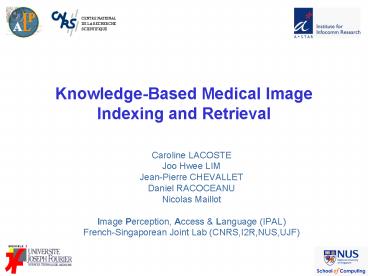KnowledgeBased Medical Image Indexing and Retrieval - PowerPoint PPT Presentation
1 / 20
Title:
KnowledgeBased Medical Image Indexing and Retrieval
Description:
Nicolas Maillot. Image Perception, Access & Language (IPAL) ... Nicolas MAILLOT. Jean-Pierre CHEVALLET. Joo Hwee LIM. Image Perception, Access & Language (IPAL) ... – PowerPoint PPT presentation
Number of Views:125
Avg rating:3.0/5.0
Title: KnowledgeBased Medical Image Indexing and Retrieval
1
Knowledge-Based Medical Image Indexing and
Retrieval
- Caroline LACOSTE
- Joo Hwee LIM
- Jean-Pierre CHEVALLET
- Daniel RACOCEANU
- Nicolas Maillot
- Image Perception, Access Language (IPAL)
- French-Singaporean Joint Lab (CNRS,I2R,NUS,UJF)
2
Approach
- Indexing both image and text using medical
concepts from the NLMs Unified Medical Language
System (UMLS) - To incorporate expert knowledge
- To work at a higher semantic level
- To unify text and image
- Structured learning approach to extract medical
semantics from images (e.g. modality, anatomy,
pathology) - Fusion between textual and visual information
3
UMLS-based text indexing
- UMLS (Unified Medical Language System)
- Multilingual meta-thesaurus 17 languages
- Large More than 50000 concepts, 5,5 millions of
terms - Consistent categorization of concepts in
semantic types - Why using concepts and not terms ?
- Remove the problem of term variation / synonymy
- Ex Fracture and Broken Bones
- Natural multi-lingual indexing
- Using Meta-Thesaurus Structure
- Vector space model does not take into account
this structure - Using Semantic Dimension (Given by the UMLS)
- Tested this year
- Dimension filtering At least one matching
according one of the three dimension - Dimension weighting Re-weight similarity
according to the number of matched dimension
4
Semantic Image Indexing
?
Computed Tomography Chest Nodules
- Low-level features
- Color
- Texture
- Shape
- High level features
- Modality
- Anatomy
- Pathology
- Supervised learning framework
- Global indexing to access image modality
- Local indexing to access semantic local features
related to anatomy, modality, and pathology
concepts
5
Global Indexing
Angiography
Color histogram Texture Gabor features Spatial
Thumbnails
X-ray
Micro
MRI Head Sagittal
Low-level feature extraction
Learning set 4000 images
Learning
Modality-anatomy probabilities
32 VMTs (modality, anatomy, spatial UMLS
concepts, and color percepts)
SVM
VMT indexes P(VMTI)
Low-level feature extraction
Medical Image I
Semantic Classification
VMTVisual Medical Terms
6
Local indexing
Color first moments Texture Gabor features
X-ray Bone Fracture
Low-level feature extraction
Learning set 3631 patches
Learning
64 local VMTs (modality, anatomy, pathology
concepts, and color percepts)
SVM
VMT indexes per block
Low-level feature extraction per patch
Semantic Classification per patch
Spatial Aggregation in grid layout (3x3, 3x1,
3x2, 1x3, 2x3)
7
Visual retrieval
- Retrieval using the global visual indexing
- Retrieval based on the Manhattan distance between
2 indexes (histogram of modality-anatomy
concepts) - Modality filtering according to the textual query
modality concepts - I admissible if P( modQ I) gt T
- Retrieval using the local indexing
- Retrieval based on the mean of Manhattan
distances between local VMT histograms - Late Fusion mean of the two similarity measures
8
Medical Image Retrieval
MetaMap
UMLS concepts
- Typical
- query
Show me x-ray images with fractures of the femur.
Low-level features
UMLS-based features
SVM classifiers
9
Comparative Results on CLEF2005
10
Conclusion
- CLEF multilingual medical image retrieval task
- Very difficult task large collection, precise
and semantic queries - Concept Indexing
- It works !!
- Inter-media common indexing
- Multilingual
- Image and text complementary
- Text closer to the meaning
- Efficiency of the visual filtering to remove
aberrant images - Importance of
- semantic dimensions for text
- visual terms and learning
- The UMLS indexing induces a lot of perspectives
- Early fusion
- Semantic-based retrieval
11
Inter-Media Pseudo-Relevance FeedbackApplication
to ImageCLEF Photo 2006
Nicolas MAILLOT Jean-Pierre CHEVALLET Joo Hwee
LIM Image Perception, Access Language (IPAL)
French-Singaporean Joint Lab (CNRS,I2R,NUS,UJF)
12
Inter-Media Pseudo-Relevance Feedback
- Problem
- Multi-modal (textimage) Information Indexing and
Retrieval - Multi-modal documents
- Multi-modal queries
- Application to the ImageCLEF Photo Task
- Objectives
- Inter-media enrichment
- dealing with synonymy
- Re-using existing mono-media image and text
retrieval systems
13
Inter-Media Pseudo-Relevance Feedback
- Related Works
- Mono-modal pseudo-relevance feedback Xu and
Croft 96 - Translation models Lin et al. 05
- Automatic translation of the textual query into a
visual query - Requires prior mining of textual/visual
relationships - Late Fusion Chevallet et al. 05
- Text and image retrieval are done in parallel and
the results are merged (weighted sum) - No mutual enrichment
- Latent Semantic Indexing (textvisual keywords)
- Computationally expensive
14
Inter-Media Pseudo-Relevance Feedback
- Text Processing
- Morpho-Syntax
- Part of Speech Tagging
- Unknown Proper Nouns detection
- Word Normalization Spelling correction
- Index terms
- Noun Phrase detection using WordNet
- Geographic named entities detected using Wordnet
or the ltLOCATIONgt tag - Concept Indexing
- Selection based on the most frequent sense
provided by Wordnet
15
Inter-Media Pseudo-Relevance Feedback
- Image Processing
- Image Segmentation
- Meanshift Segmentation
- Patch Based Tessellation
- Feature Extraction
- Color histograms
- Bags of SIFT
- Scale Invariant Feature Transform
- Gabor Features (Texture)
Extraction of one local orientation histogram per
location
16
Inter-Media Pseudo-Relevance Feedback
Overview
Expanded Query
Top k Retrieved Documents
Text
Image
Text
Text Query Expansion
Image
Text
Image Retrieval Engine
Text Retrieval Engine
Ranked Documents
Query
Image
Text
Index Documents
17
Inter-Media Pseudo-Relevance Feedback
Results
18
Inter-Media Pseudo-Relevance Feedback
- Conclusion
- Using the image modality to expand the text query
- Use of the text associated with the top k images
retrieved - Assumption these k images are relevant
- Future work
- Advanced conceptual filtering and reasoning
- some concepts are not characterized by the visual
appearance - Comparison with the translation model
19
Thanks !
20
Supervised learning framework
Low-level feature extraction
Learning set VMT instances
Learning
SVM classifiers
VMT indexes P(VMTI)
Low-level feature extraction
Image/Region
Semantic Classification































